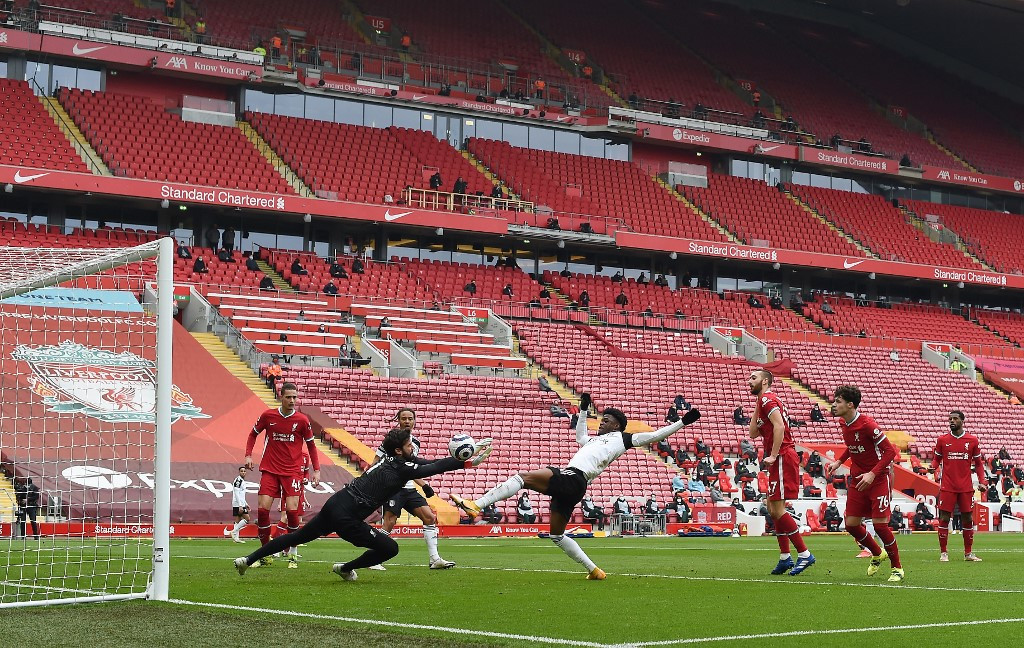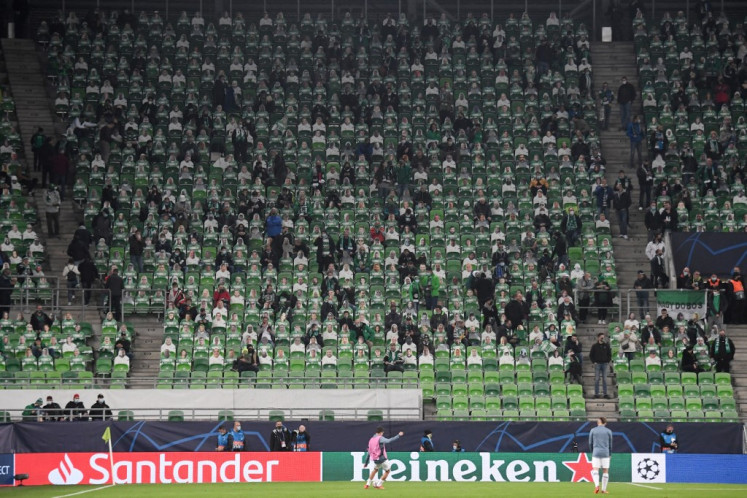Popular Reads
Top Results
Can't find what you're looking for?
View all search resultsPopular Reads
Top Results
Can't find what you're looking for?
View all search resultsA year of empty stadiums lays bare what soccer has missed
But the 2,000 or so supporters also sensed things were about to change. While they could watch their team play that day, games in leagues above them had been cancelled across England as the coronavirus pandemic spread.
Change text size
Gift Premium Articles
to Anyone
 A general view inside the empty stadium is pictured as Liverpool's Brazilian goalkeeper Alisson Becker saves a shot from Fulham's Nigerian striker Josh Maja during the English Premier League football match between Liverpool and Fulham at Anfield in Liverpool, north west England on March 7, 2021.
(Agence France Presse/Paul ELLIS )
A general view inside the empty stadium is pictured as Liverpool's Brazilian goalkeeper Alisson Becker saves a shot from Fulham's Nigerian striker Josh Maja during the English Premier League football match between Liverpool and Fulham at Anfield in Liverpool, north west England on March 7, 2021.
(Agence France Presse/Paul ELLIS )
A
year ago at The Shay, home to fifth-tier English soccer club Halifax FC, fans followed time-honoured traditions - they walked to the match from local pubs and queued for pie at half time.
But the 2,000 or so supporters also sensed things were about to change. While they could watch their team play that day, games in leagues above them had been cancelled across England as the coronavirus pandemic spread.
"I have a feeling this might be the last football match that takes place in the country for a good while," said fan Nathan Sinclair.
He was right.
For over three months, there was no soccer of any kind in England, where it is by far the most popular sport.
The Premier League - the world's richest - and the Football League returned in mid-June, while teams like Halifax had longer to wait.
Across the spectrum games have restarted on the field, yet stadiums remained empty barring a handful of exceptions in December, depriving the sport of its lifeblood.
Fans have been able to watch from home only, and what they have seen is a recognizable game in an unrecognisable context, despite efforts to compensate for the absence of crowds.
Clubs have covered empty seats with banners, flags, advertising and slogans, and in some cases cut-out faces of fans, while broadcasters use simulated crowd noise. But attempts to mitigate the lack of crowds can only do so much.
Circus without Clowns
Players have struggled as well as supporters.
"It's horrible to play without fans, it's a very ugly sensation," said Barcelona forward Lionel Messi, whose great rival Cristiano Ronaldo agreed.
"Playing without fans is like going to the circus and not seeing clowns, it's like going to the garden and not seeing flowers," said the Juventus forward.
Cardboard cutouts of fans are seen on the stands ahead of the UEFA Champions League Group G football match between Ferencvarosi TC and FC Dynamo Kyiv at the Ferencvaros Stadion in Budapest on October 28, 2020. (Agence France Presse/Attila KISBENEDEK )For the small number of journalists allowed to attend games, the reality had been laid bare - a soccer match without fans is a soulless occasion.
Technique and tactics, endeavour and athleticism are there to be admired, but much of what makes a professional match special is absent.
It is not only the roar of a crowd when a goal is scored that is missing, but groans of frustration and applause of appreciation. The emotion has gone.
That makes life harder for the 22 players on the field and the support staff on the sidelines.
"Not seeing anyone in the stadium makes it like training, and it takes a lot to get into the game at the beginning," said Messi.
For reporters, watching live soccer has been both a privilege and a stark reminder of what has been missing for the past 12 months - being together with friends, switching off from work and enjoying a drink, a joke, a celebration, an argument.
As the game in England prepares for the return of fans, their long absence might prompt the sport's administrators and owners to reflect on what really counts.
The language of soccer is often that of a business - not surprising given it is a multi-billion-dollar global industry.
But the last year has shown that the sport has missed its passionate supporters as much as they have missed the sport.
English novelist J.B. Priestley summed up almost a century ago the escapism and drama that standing in the crowd can bring:
"...there you were, cheering together, thumping one another on the shoulders, swopping judgements like lords of the earth, having pushed your way through a turnstile into another and altogether more splendid kind of life, hurtling with Conflict and yet passionate and beautiful in its Art."










